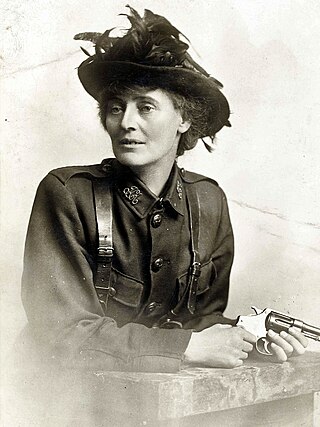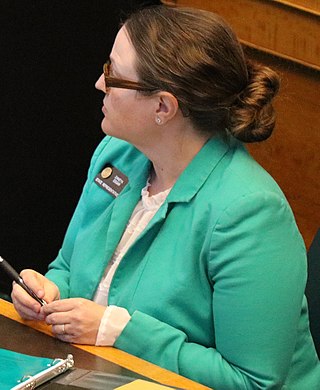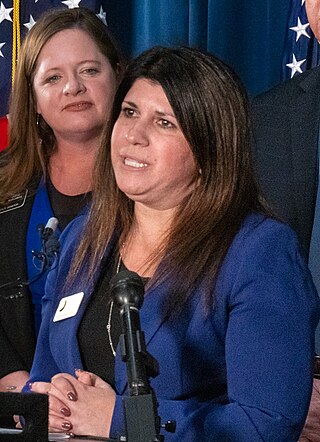Related Research Articles

The Colorado House of Representatives is the lower house of the Colorado General Assembly, the state legislature of the U.S. state of Colorado. The House is composed of 65 members from an equal number of constituent districts, with each district having roughly 80 thousand people. Representatives are elected to two-year terms, and are limited to four consecutive terms in office, but can run again after a four-year respite.

The Illinois House of Representatives is the lower house of the Illinois General Assembly. The body was created by the first Illinois Constitution adopted in 1818. The House under the current constitution as amended in 1980 consists of 118 representatives elected from individual legislative districts for two-year terms with no limits; redistricted every 10 years, based on the 2010 U.S. census each representative represents approximately 108,734 people.

Ruth McCormick, was an American politician, activist, and publisher. She served one term in the United States House of Representatives, winning an at-large seat in Illinois in 1928. She gave up the chance to run for re-election to seek a United States Senate seat from Illinois. She defeated the incumbent, Senator Charles S. Deneen, in the Republican primary, becoming the first female Senate candidate for a major party. McCormick lost the general election. A decade later, she became the first woman to manage a presidential campaign, although her candidate, Thomas E. Dewey, failed to capture his party's nomination.

The Kentucky House of Representatives is the lower house of the Kentucky General Assembly. It is composed of 100 Representatives elected from single-member districts throughout the Commonwealth. Not more than two counties can be joined to form a House district, except when necessary to preserve the principle of equal representation. Representatives are elected to two-year terms with no term limits. The Kentucky House of Representatives convenes at the State Capitol in Frankfort.
Government in Australia is elected by universal suffrage and Australian women participate in all levels of the government of the nation. In 1902, the newly formed Commonwealth of Australia became the first nation on earth to enact equal suffrage, enabling women to both vote and stand for election alongside men Women have been represented in Australian state parliaments since 1921, and in the Federal Parliament since 1943. The first female leader of an Australian State or Territory was elected in 1989, and the first female Prime Minister took office in 2010. In 2019 for the first time, a majority of members of the Australian Senate were women. At the time of its foundation in 1901, and again from 1952 to 2022, Australia has had a female monarch as ceremonial Head of State, while the first female Governor of an Australian State was appointed in 1991, and the first female Governor-General of Australia took office in 2008.
Representation by women has been a significant issue in Canadian politics since 1900.
There have been 92 women in the New South Wales Legislative Assembly since its establishment in 1856. Women have had the right to vote in the assembly since 1902 and the right to stand as a candidate since 1918.

Selina Sarah Elizabeth Siggins was an Australian political activist who became the first woman to stand for the Australian House of Representatives. She ran as an independent at the 1903 federal election, the first at which women were eligible to be candidates. Although she spent most of her life in New South Wales, in 1918 she also became one of the first two women to stand for the Parliament of South Australia. Siggins was introduced to politics through her involvement in the labour movement, and initially supported the Labor Party. She eventually fell out with the party over its refusal to endorse her as a candidate. Her final run for parliament came at the 1922 federal election, where she became the first woman to stand for the Country Party.
Women have served in the United States House of Representatives, the lower chamber of the United States Congress, since 1917 following the election of Republican Jeannette Rankin from Montana, the first woman in Congress. In total, 378 women have been U.S. representatives and seven more have been non-voting delegates. As of November 12, 2024, there are 127 women in the U.S. House of Representatives, making women 29.2% of the total. Of the 385 women who have served in the House, 253 have been Democrats and 132 have been Republicans. One woman was the 52nd Speaker of the House, Democrat Nancy Pelosi of California.
Dickey Lee Hullinghorst is a former legislator in the U.S. state of Colorado and a former Speaker of the Colorado House of Representatives. She was elected as a Democrat in 2008. Hullinghorst represented House District 10, which encompasses central eastern Boulder and northeastern Boulder County, Colorado.

Ndemupelila Netumbo Nandi-Ndaitwah, nicknamed NNN, is a Namibian politician who became president-elect of Namibia after winning the presidential election on 3 December 2024. She is scheduled to be Namibia's fifth president and the first woman to hold this position. She is serving as the third vice-president of Namibia since February 2024. She was also SWAPO's first female presidential candidate for the 2024 Namibian general election. In 2017, Nandi-Ndaitwah was elected vice-president of SWAPO, the first woman to serve in that position.

The representation of women in the House of Commons of the United Kingdom has been an issue in the politics of the United Kingdom at numerous points in the 20th and 21st centuries. Originally debate centred on whether women should be allowed to vote and stand for election as Members of Parliament. The Parliament Act 1918 gave women over 21 the right to stand for election as a Member of Parliament. The United Kingdom has had three female Prime Ministers: Margaret Thatcher (1979–1990), Theresa May (2016–2019), and Liz Truss (2022). The publication of the book Women in the House by Elizabeth Vallance in 1979 highlighted the under-representation of women in Parliament. In more modern times concerns about the under-representation of women led the Labour Party to introduce and, decades later, abandon all-women short lists, something which was later held to breach discrimination laws.

The 1902–03 United States Senate elections were held on various dates in various states. As these U.S. Senate elections were prior to the ratification of the Seventeenth Amendment in 1913, senators were chosen by state legislatures. Senators were elected over a wide range of time throughout 1902 and 1903, and a seat may have been filled months late or remained vacant due to legislative deadlock. In these elections, terms were up for the senators in Class 3.

Women have served in state legislatures in the United States since 1895. Their ranks have increased with the advent of nationwide women's suffrage after 1920. Although the number of women serving in state legislatures has more than quintupled since 1971, they remain underrepresented. In 2023, women held less than half of the seats in state legislatures across the majority of states. Specifically, seven states —Oklahoma (19.2%), Louisiana (19.4%), Alabama (17.4%), South Carolina (14.8%), Mississippi (14.5%), Tennessee (14.4%), and West Virginia (11.9%)— had legislatures where women occupied less than 20% of the seats.

Daneya Leigh Esgar is a politician who serves as a county commissioner in Pueblo County, Colorado. Prior to her tenure on the county commission, she was a Democratic member of the Colorado House of Representatives. She represented District 46, which covered a portion of Pueblo County. She was first elected to her statehouse seat in 2014, succeeding Leroy Garcia. Term limited, she left office in January 2023.

Brianna Titone is an American politician and scientist, currently serving as a member of the Colorado House of Representatives from the 27th district. Titone serves in the 74th Colorado General Assembly and is the first openly transgender state legislator elected in Colorado and the 4th elected in the United States.

Jamaica is the first English-speaking country in the Caribbean to achieve universal adult suffrage and grant women the right to be elected to Parliament. Between 1944 and 2020, a total of 47 women have been elected as members of the House of Representatives. As of September 2020 there are 18 women in the House of Representatives, the highest ever. This is a new all-time high at 29% and is the first time that female representation in the House of Representatives stands at more than a quarter of the total membership.

In 1893, Colorado became the second state in the United States to grant women's suffrage and the first to do so through a voter referendum. Even while Colorado was a territory, lawmakers and other leaders tried to include women's suffrage in laws and later in the state constitution. The constitution did give women the right to vote in school board elections. The first voter referendum campaign was held in 1877. The Woman Suffrage Association of Colorado worked to encourage people to vote yes. Nationally-known suffragists, such as Susan B. Anthony and Lucy Stone spoke alongside Colorado's own Alida Avery around the state. Despite the efforts to influence voters, the referendum failed. Suffragists continued to grow support for women's right to vote. They exercised their right to vote in school board elections and ran for office. In 1893, another campaign for women's suffrage took place. Both Black and white suffragists worked to influence voters, gave speeches, and turned out on election day in a last-minute push. The effort was successful and women earned equal suffrage. In 1894, Colorado again made history by electing three women to the Colorado house of representatives. After gaining the right to vote, Colorado women continued to fight for suffrage in other states. Some women became members of the Congressional Union (CU) and pushed for a federal suffrage amendment. Colorado women also used their right to vote to pass reforms in the state and to support women candidates.

Rose Pugliese is an American politician from El Paso County, Colorado. A Republican, Pugliese represents Colorado House of Representatives District 14, which, after 2020 reapportionment, encompasses northern El Paso County, including much of the city of Colorado Springs.
References
- ↑ Pearson's Magazine. Pearson Publishing Company. 1903.
- ↑ Weatherford, Doris (20 January 2012). Women in American Politics: History and Milestones. ISBN 9781608710072.
- ↑ House Journal of the General Assembly of the State of Colorado. 1903.
- ↑ "Leaders of all parties in Colorado announce equal suffrage policy a failure". Pawnee Courier Dispatch. December 6, 1906. p. 6. Retrieved February 2, 2024.
.
- ↑ "<Women who served in the Colorado House of Representatives>" . Retrieved February 2, 2024.